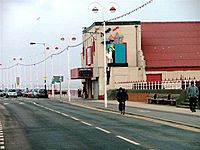Coatham Pier facts for kids

Regent Cinema, the last part of the pier to exist
|
|
| Official name | Victoria Pier, Coatham |
|---|---|
| Type | Promenade and pleasure pier |
| Carries | Promenaders |
| Spans | North Sea |
| Locale | Newcomen Terrace, Coatham, Redcar, Redcar and Cleveland |
| Owner | Coatham Victoria Pier Company |
| Total length | 1,800 feet (549 m) |
| Opening date | 1875 |
| Destruction date | 1898 |
| Coordinates | 54°37′21″N 1°04′14″W / 54.6226°N 1.0705°W |
Coatham Pier, also known as Victoria Pier, Coatham, was a fun place built on the coast in Coatham, Redcar. It was a long structure reaching out over the North Sea. People loved to walk along it and enjoy the views.
Contents
Building the Pier
Planning the Design
In 1870, people started talking about building a pier in Coatham. After many discussions, they decided to build it on Newcomen Terrace. This spot was at the end of Newcomen Street.
On September 22, 1870, a company called the Coatham Victoria Pier Company was officially started. Just a few days later, they got special permission from Parliament to build the pier.
The original plan was for the pier to be 2,250 feet (686 m) long. It would have two large buildings, called pavilions. It would also have two small ticket booths, known as kiosks. One pavilion was meant for live music. The other, closer to the entrance, was planned to be a roller skating rink.
Construction and Early Challenges
Work on Coatham Pier began in 1871. Parts of the pier were opened to the public starting in July 1872. This allowed people to visit even before it was fully finished.
However, a big storm hit on December 8, 1874. Two ships crashed into the pier before it was complete. The first ship, named Griffin, hit the pier around 4 AM. It caused two large breaks, splitting the pier into three pieces.
In the same storm, another ship called Corrymbus also crashed through the pier. It went right between the planned pavilions. Luckily, no lives were lost from these shipwrecks.
Because of the damage, repairing the pier was very expensive. So, the builders decided to make the pier shorter than planned. Instead of 2,250 feet (686 m), it would be 1,800 feet (549 m) long. The pier was finally finished and opened in 1875.
Life on the Pier
Fun Activities
Even though it was shorter, Coatham Pier was still a great place. It had the music pavilion about halfway along its length. This was where people could listen to orchestras play.
Near the entrance, there was the indoor roller skating rink pavilion. This was a popular spot for people to skate and have fun. There were also two kiosks at the entrance. One was for buying tickets to get onto the pier. The other sold newspapers and books.
The Pier's End
On October 22, 1898, Coatham Pier was badly damaged again. A large ship called the Birger crashed into it during a big storm. The ship was carrying salt and was forced against some rocks.
The collision created a huge 100 yards (91 m) gap in the pier. This cut off the music pavilion from the rest of the pier. The ship was wrecked, and many lives were lost.
The part of the pier that was cut off collapsed about a year later. In 1899, the company that owned the pier went out of business. The rest of the pier was left to fall apart. Eventually, it was sold for scrap metal.
Only the roller skating rink pavilion and the entrance kiosks remained for a while. Years later, the anchor from the Birger ship was found by divers. It was brought ashore and put on display near the Zetland Lifeboat Museum.
Images for kids
 | Audre Lorde |
 | John Berry Meachum |
 | Ferdinand Lee Barnett |


